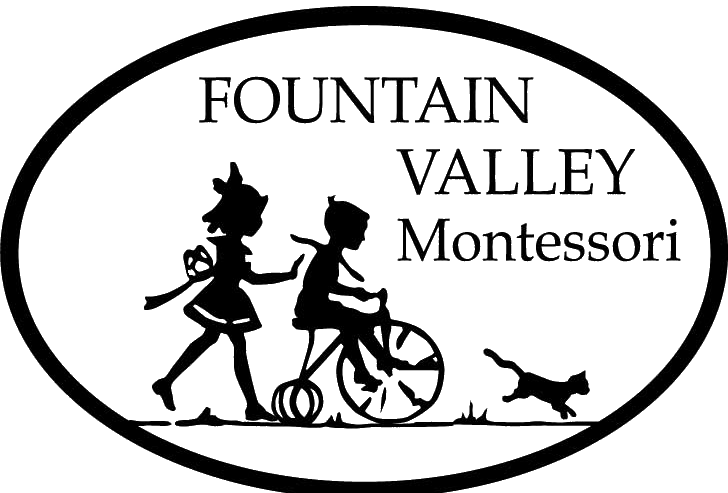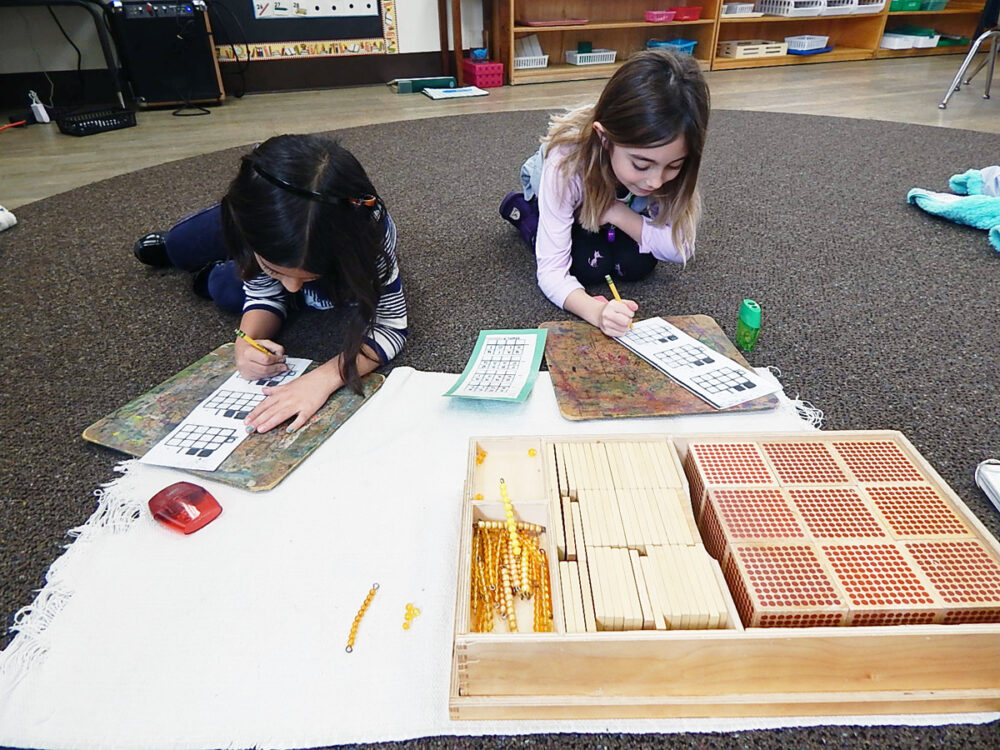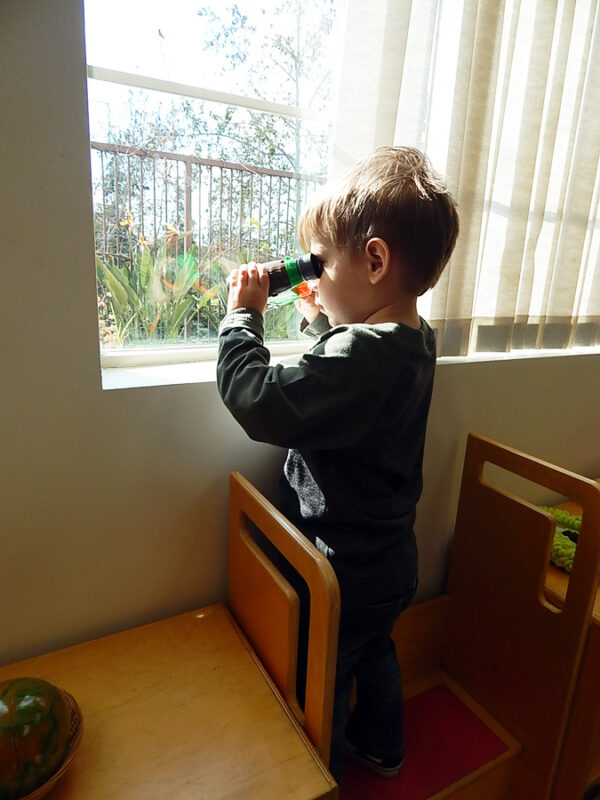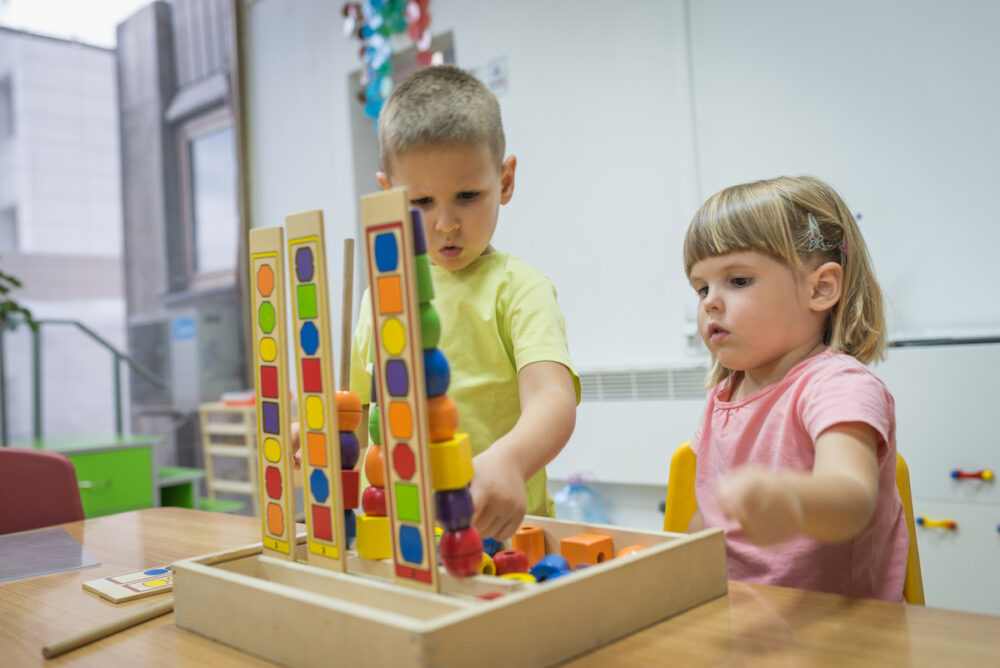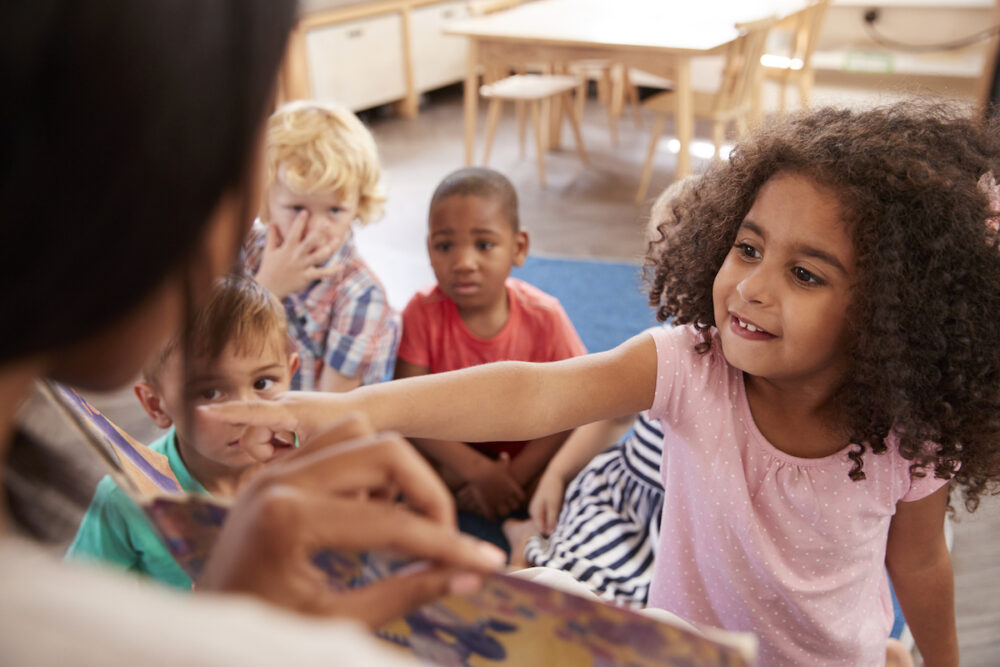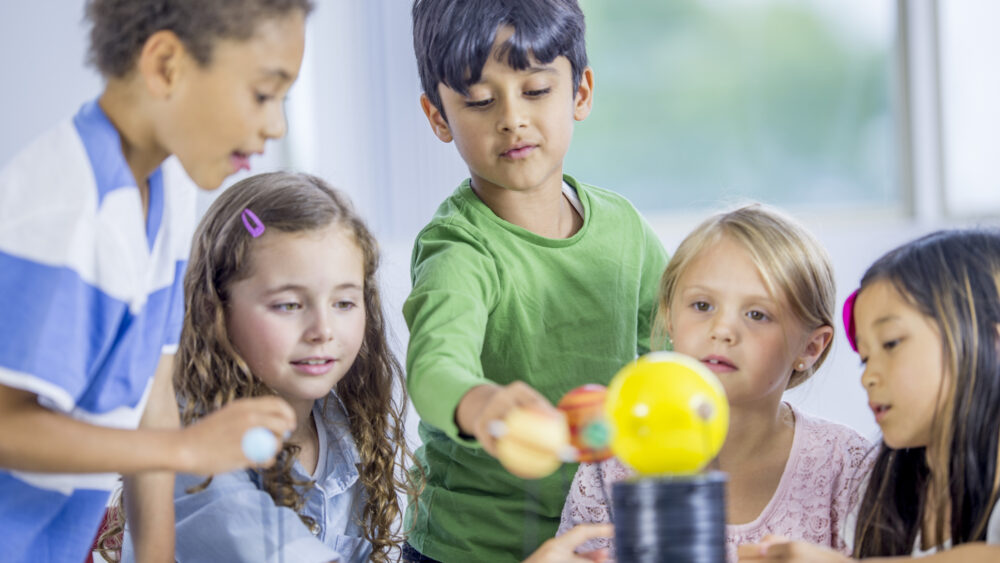The Montessori Method
This condensed explanation will acquaint you with the many advantages that Montessori offers your child.
- The Montessori Method has been time-tested for over 100 years and has achieved success throughout the world.
- Each child is taught and assessed individually.
- The child’s natural development of language is utilized in the process of learning to read.
- The child has the unique opportunity to fulfill his potential.
- Habits and skills developed in a Montessori classroom remain for a lifetime.
- The Montessori Classroom is a land of opportunity for the child and he or she considers it a truly joyful place to be.
- The teacher’s role is to give personal attention. She will not interfere with a child’s exploration, but will be readily available if help is required. She models behavior taught in the classroom.
Toddler (Ages 2 – 3 years)
The Toddler Program at Fountain Valley Montessori is a specialized curriculum for children ages 24 to 36 months, serving as a preparatory program for transition into a Montessori preschool. Children are exposed to Practical Life activities and the beginnings of the Sensorial materials which are appropriate for the emergent two-year-old. Water work, puzzles, math activities, manipulatives, and language tasks round out the choices available during the daily work time. The concept of grace and courtesy is introduced and implemented during morning snack and lunchtime.
Each month, the children explore a different Color of the Month, Book of the Month, and Song of the Month. The work activities, art projects, and circle time selections all reinforce the monthly curriculum. The ratio in the classroom is one-to-six; i.e., one teacher per six children, ensuring that children who have not yet had an academic experience will make a successful transition into a group care environment. Toilet training is also an important component of the Toddler Program and teachers work closely with parents to guarantee a painless progression to independent toileting.
A limited number of spaces are available each year. Please contact us to find out more!
Preschool (Ages 3-5 years)
Preschool is an exciting time for a Montessori child. The Montessori curriculum is more advanced than most Pre-K programs. Children are introduced to basic geometry, geography, science, and other sophisticated concepts. They also begin to read, while pre-k students in many other programs are just learning to recognize letters and numbers.
We provide intriguing learning materials that encourage engagement and a joy of learning. Students learn through hands-on experience, investigation, and research. They become actively engaged in their studies, rather than passive listeners.
Curriculum
Practical Life – A child is naturally attracted to activities that give him or her independence. Children seek autonomy and control of their lives. Practice with pouring, carrying, serving, tying, sweeping, and washing are a few examples of exercises that help the young child to coordinate his movement and establish order and good working habits. Practical Life exercises also help develop a longer attention span, deeper concentration, and precision. Because lessons are presented in a left to right and top to bottom manner, they provide an indirect preparation for reading. Advanced exercises include cooking, weaving, crochet, sewing, and woodworking.
Sensorial – The Sensorial materials help the child to develop order and clarity in thinking. They include activities to aid the child to classify, discriminate, and to compare and contrast size, weight, shape, texture, color, taste, sound, and smell. Most Sensorial materials are mathematically based and provide opportunities for movement and intellectual challenges. Additionally, they introduce a rich vocabulary to the children.
Language – The Language activities explore the sound/symbol relationship through the use of objects, movable alphabet letters, and reading cards. Skills gained in Practical Life and Sensorial work help prepare the child for reading, writing, and grammar. Language is taught phonetically and multi-sensorial – with visual, auditory, and kinesthetic activities. Quality children’s literature is presented daily. Our school library helps to promote a love of reading.
Mathematics – Hands-on materials include exercises in quantity, symbols, place value, and relationships between quantities. Because the work progresses from concrete to abstract using manipulative materials, children easily grasp mathematical concepts in addition, subtraction, multiplication, division, fractions, and geometry. The exercises not only teach the child to calculate, but they provide a deep understanding of place value and how numbers function.
Science/Geography – These activities are designed to help the child become aware of and appreciate the diversity of the world. By examining the human, plant, and animal world, the child gains exposure to the life that surrounds him or her. The child is taught respect for taking care of his or her environment. Continent and country studies introduce the child to people, geography, music, food, and art.
Extra-Curricular – Our curriculum is far-reaching and is often triggered by the children’s interests. As the class gets excited about an idea, our teachers bring in materials, music, food, speakers, and lessons. Children also have weekly foreign language instruction. Students may also elect to enroll in special classes after school hours including music, dance, sports, gymnastics, and science.
A limited number of spaces are available each year. Please contact us to find out more!
Elementary (Ages 5-9 years)
Completion of the Montessori preschool and kindergarten program does not mark the end of the Montessori experience. In fact, it is a new beginning in the child’s learning potential. By age six, the child is ready to build upon the concrete learning pathways of preschool and move to the more abstract concepts in the elementary program. These new concepts include thinking about the big ideas of the universe. Students trace the timeline of all living things through geology, physical science and biology demonstrations, and experiments. These lessons provide a framework for our curriculum and carry a common theme that all living things have a cosmic role in life and are all interconnected. As humans, our job is to strive for our potential, carrying out our role, just as the sun does its best job to warm and protect us, or a plant does its job to provide oxygen and food. Stories, activities, and lessons continue to provide an important theme to the students. In time, they discover their potential and cosmic place. Helping children to see their importance on earth is a central theme. Once a child realizes his or her significance, everything else we do in class becomes easy and rewarding.
Curriculum
Of course, the program also offers the same benefits of the preschool program: individualized education, cooperative group work, choice of activity, and independence. The children also learn how to manage their time and resources, as they are held accountable for completion of daily, weekly, and long-term assignments. They quickly learn that privileges are earned and consequences experienced when time is not utilized efficiently. Because we cannot predict what our ever-changing world will require our children to know 15 or 20 years from now, our goal is not so much what the children learn, but rather what to do and where to go for new knowledge. Study skills, presentation techniques, computers, and reference books are all part of the program.
Our broad curriculum absolutely exceeds state standards with areas of study including:
- Language: Reading, Spelling, Grammar, Word Study, Creative Writing, Literature, Handwriting, Poetry
- Mathematics: Counting, Place Value, the Four Operations, Decimal System, Fractions, Time, Money, Geometry, Graphing, Logic, Problem Solving, Probability, Squaring, Cubing, and Algebra
- Science: Botany, Zoology, Ecology, Geology, Nutrition, Human Body Study, Chemistry, Physical Science
- History and Social Studies: Physical and Political Geography, Economics, Timeline of Life, Early Humans, Ancient Civilizations, Native Americans, and American History
- Advanced Practical Life Skills: Cooking, sewing, weaving, plant and pet care. We maintain a well-kept classroom thanks to the weekly student jobs such as table washing, dusting, sweeping, recycling, and taking out the trash.
- Enrichment: Art, Drama, Music, Music History and Appreciation, Computer, Physical Education, and Foreign Language. Optional classes include Dance, Sports, Gymnastics, Science, and Spanish.
Assessment: The Montessori curriculum is carefully sequenced. Teachers record all student progress through careful observation. Each child’s progress is assessed individually and he or she is not compared to the performance of other children. Therefore, traditional letter grades are not necessary. Children have simply presented in the next lesson as they master the one before. This creates a non-competitive environment of safety and acceptance. Children thrive when they do not feel rushed and stressed. Teachers have conferences with parents twice a year, in which they discuss the child’s progress and areas of growth. Students are actively involved in preparing for these meetings. Teachers are available year-round for additional meetings.
Homework: Children are especially focused and productive during our three-hour stretch of work time each morning. Teachers stay in close touch with their studies and carefully look overall work that is accomplished each day. For this reason, we do not find a reason to send home repetitive work. Therefore, homework for our students is very light. Daily reading is expected. Weekly spelling and practice with new math facts are practiced. We also invite active participation in home life – shopping, making dinner, a share of family work, etc. We support participation in team sports and many of our students play musical instruments. Occasionally, a student may need some reinforcement of a skill, at which point the parents and teachers discuss a home plan. As the student’s transition into upper elementary grades, a light amount of homework is expected to help the children develop the skill of accountability. This homework includes practical daily living skills, journaling, and high-level thinking games and logic.
Nutrition: Our schools feel strongly about the whole child – body, mind, and spirit. Our wonderful materials address the mind, and our community building addresses the spirit. But neither will be at their best if we do not take care of the body. Therefore, we have a low-sugar policy and encourage healthy lunches and snacks free of sugar, preservatives, and artificial ingredients.
Long Term Benefits
Many people ask how well a child will later transition to a traditional school. Because our teachers blend the Montessori math, language, science, and geography materials with the use of some traditional materials, the children are well equipped at any age to transition out of Montessori. In fact, they leave our school with skills that will aid them the rest of their lives: flexibility, problem-solving, questioning strategies, research experience, and high academic skills. We expose the children to a vast variety of learning materials and also emphasize life-long learning, respect, and cooperation. A typical Montessori elementary child is not only intellectually very competent but also possesses leadership, collaboration skills, and a love of learning that far surpasses most others.
A limited number of spaces are available each year. Please contact us to find out more!
Exercises and activities
Practical Life
The objectives of Practical Life exercises are to help the child develop stronger concentration and coordinated movement. These exercises enable the child to adapt to his environment and establish independence.
Sensorial
The Sensorial materials help the child to develop order and clarity in thinking. They include activities to aid the child in classification, comparison, and contrast of size, weight, shape, texture, color, etc.
Language
The Language activities are designed to develop the child’s ability to communicate through spoken language, to explore the sound/symbol relationship, to express self through written work and to use skills gained in Practical Life and Sensorial work for sequencing and performing small controlled movements.
Mathematics
Hands-on Mathematics exercises explore ways in which quantities are related by identifying number symbols and associating them to quantities, and by exploring similarities and differences between quantities. The work progresses from concrete to abstract using manipulative materials.
Science/Geography
These activities are designed to help the child become aware of, and appreciate, the diversity of the world. By examining the human, plant, and animal world, the child gains exposure to the life that surrounds them. The child is taught a respect for taking care of his environment.
Other Montessori Links
Before and After School Care
We offer convenient before and after school care programs. Please contact us for details.
